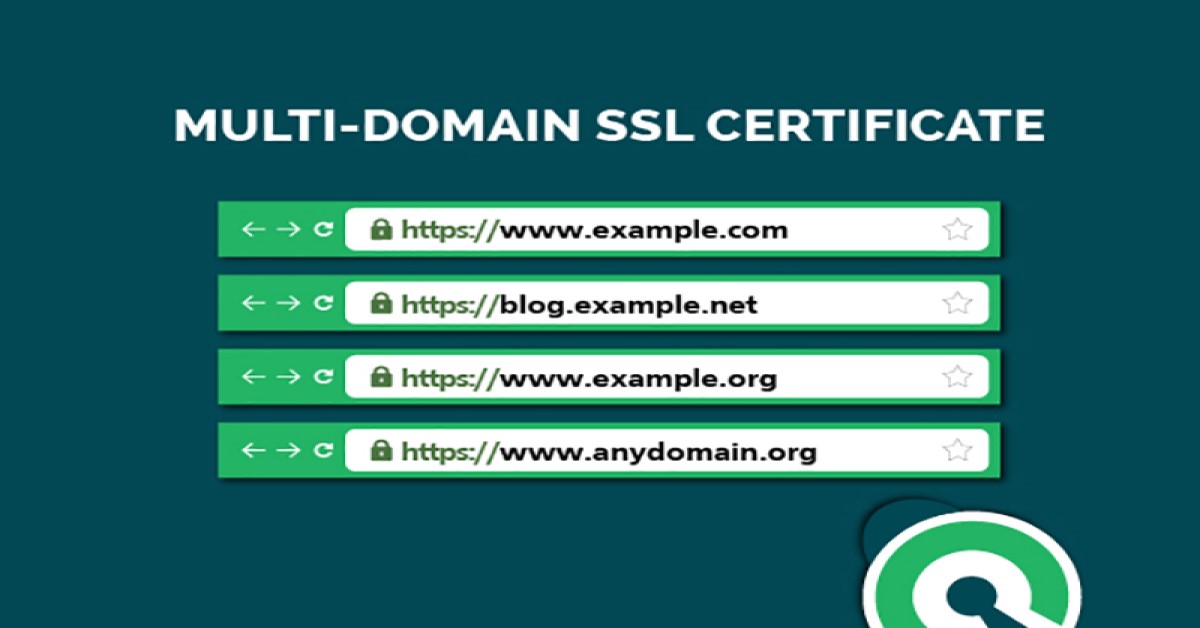SSL Certificate
Deploy an SSL certificate to enable HTTPS encryption of websites, trusted identity authentication and prevent against data leaks or tampering during transmission.
Get SSL Certificate >Blog > What Is a Multi-domain SSL Certificate and How Does It Secure Multiple Websites?
Tag:
Multi-domain SSL Certificate
SAN Certificate
Single Domain SSL Certificate
1637:0
CatherineJune 21 2023

When users apply for SSL certificates for the first time, they may mistakenly think that an SSL certificate can only be used for one domain. For single domain certificates, this is indeed the case. Due to the changing role of websites in company business development, more and more enterprises now have more than one website to expand their business landscape. This is where Multi-Domain Certificates come into play. In this article, we will discuss the concept of Multi-Domain Certificates and explore how they work to secure multiple websites efficiently.
A Multi-Domain Certificate, also known as a Subject Alternative Name (SAN) Certificate, is an SSL/TLS certificate that allows organizations to secure multiple domains, subdomains, or IP addresses within a single certificate. In most cases, it allows you to protect up to 250 domains throughout the certificate's lifecycle. They offer flexibility and convenience, enabling businesses to protect and manage different domain names with one certificate.
In addition, you can install it on an unlimited number of servers. If you have a domain that has multiple subdomains to be protected, multi-domain name certificates allow you to secure wildcard domains too, saving you the trouble of apply for multiple SSL certificates. This brings us back to the original definition of a multi-domain certificate - one certificate that can protect all your domains and first-level subdomains.
Just like regular SSL certificates, obtaining a Multi-Domain Certificate requires creating a Certificate Signing Request (CSR) and generating a private key. The process involves validation, issuance, and installation. However, what sets the Multi-Domain Certificate apart is the presence of an additional field called Subject Alternative Name. This field allows you to list additional domains that can be protected by the certificate.
Assume that you have the following four websites and want to secure and manage them with one certificate:
domain.com
nicsrs.net
baidu.com
ssltrus.cn
The domains and subdomains will be included in the SAN filed, with one of them, such as domain.com, serving as the common name under the CNAME filed. It is important to note that all domains added to the same certificate will be accessible to visitors of your sites.
1. Versatile Domain Coverage: Multi-Domain Certificates provide the ability to secure a variety of domains and subdomains. Whether you have different domains for various regions, business units, or services, a Multi-Domain Certificate can cover them all. It allows for securing domains with different extensions (TLDs) and even wildcard domains.
2. Simplified Certificate Management: Managing multiple SSL/TLS certificates for different domains can be complex and time-consuming. Multi-Domain Certificates simplify the management process by consolidating multiple domains under a single certificate. This reduces administrative overhead, streamlines certificate installation, renewal, and monitoring, and improves operational efficiency.
3. Cost and Resource Optimization: With a Multi-Domain Certificate, businesses can save costs compared to purchasing separate certificates for each domain. It eliminates the need for multiple certificate purchases. Additionally, Multi-Domain Certificates allow multiple domains to share a single IP address, optimizing resource utilization and simplifying server configurations.
4. Scalability and Flexibility: Multi-Domain Certificates are highly scalable and adaptable to changing business needs. They accommodate future domain additions, expansions, or acquisitions without the need for purchasing new certificates. This flexibility ensures that businesses can keep up with their evolving online presence.
5. Validate Your Domain and/or Organization: Multi-domain certificates are available in all three validation levels: domain validation (DV), organizational validation (OV), and extended validation (EV).
6. Compatible with All Major Browsers: Multi-Domain certificates are compatible with all major browsers. This includes popular browsers such as Google Chrome, Mozilla Firefox, Microsoft Edge, Safari, and more. Multi-Domain certificates utilize recognized encryption algorithms and standard SSL/TLS protocols, which are widely supported and implemented in various browsers.
When it comes to website security through SSL/TLS certificates, businesses can choose between Single Domain Certificates and Multi-Domain Certificates. So, what sets these two types apart?

Please note that the above table only lists some major differences between single domain certificate and a multi-domain certificate. The specific type of certificate to choose should be based on your actual needs and budget considerations.
In today's interconnected digital landscape, managing multiple websites securely is of paramount importance. Multi-Domain (SAN) SSL Certificates offer a practical solution by providing the flexibility, convenience, and cost-effectiveness of securing multiple websites, subdomains, or IP addresses within a single certificate. By simplifying certificate management, enhancing security, and optimizing resource utilization, Multi-Domain Certificates empower businesses to efficiently protect their online presence and build trust with their customers.
As a leading digital certificate service provider, NicSRS offers multi-domain certificates from renowned brands such as Sectigo, Digicert, and GlobalSign, as well as our private label sslTrus, which fully protects the security of your website. If you have any further questions, please feel free to contact us. We are committed to providing prompt and professional assistance.
RELATED
2025-02-25 14:33:23
2025-02-18 10:58:56
2025-02-14 14:41:07
2025-02-08 17:31:15
2025-02-05 18:04:51
Categories

Free SSL Tools
Top Posts
Comments